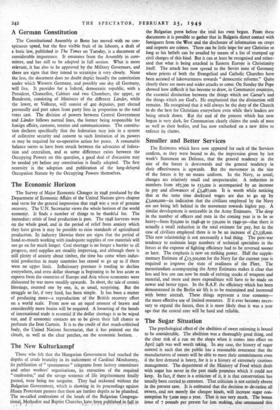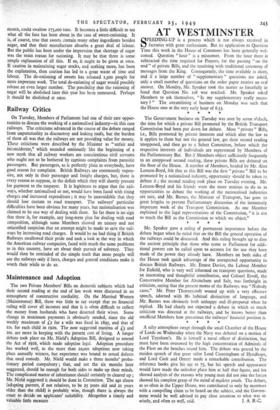The Sugar Situation
The psychological effect of the abolition of sweet rationing is bound to be considerable. The abolition was a thoroughly good thing, and the clear risk of a run on the shops when it comes into effect on April z4th was well worth taking. In any case, the history of sugar control is such that the public has a reasonable assurance that the manufacturers of sweets will be able to meet their commitments even if the first demand is heavy, for it is a history of extremely cautious management. The department of the Ministry of Food which deals with sugar has never in the past made promises which it could not keep. In fact, if there is a criticism of it, it is that conservatism has usually been carried to extremes. That criticism is not entirely absent in the present case. It is estimated that the decision to de-ration all sweets, and not merely the cheaper kinds, will increase sugar con- sumption by 7,000 tons a year. That is not very much. The bonus issue of 7 pounds per person for jam making, also announced this
month, could swallow 175,000 tons. It becomes a little difficult to see what all the fuss has been about in the case of sweet-rationing. It is, of course, true that sweets contain many other ingredients besides sugar, and that their manufacture absorbs a great deal of labour. But the public has been under the impression that shortage of sugar was the main reason for rationing. It may be that there is some simple explanation of all this. If so, it ought to be given at once. If caution in maintaining sugar stocks, and nothing more, has been the explanation, then caution has led to a great waste of time and labour. The de-rationing of sweets has released 1,500 people for more important work. The total de-rationing of sugar would possibly release an even larger number. The possibility that the rationing of sugar will be abolished later this year has been rumoured. Perhaps it should be abolished at once.



































 Previous page
Previous page